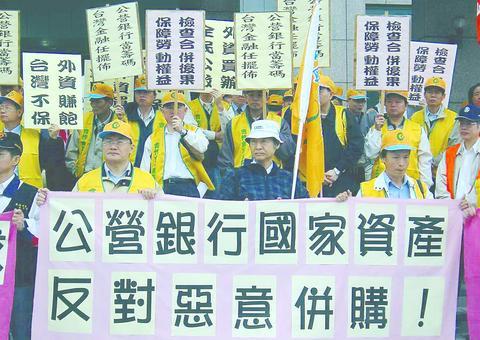Violence was narrowly averted yesterday at a meeting between union representatives of local banks and the Financial Super-visory Commission (FSC) as union members petitioned the commission to facilitate the merger of four state-run financial institutions.
The National Federation of Bank Employees' Unions (銀行員工會) told the commission that the government's goal to consolidate the domestic financial sector was not in the best interests of bank employees.

PHOTO: THE NATIONAL FEDERATION OF BANK EMPLOYEES' UNIONS
Surrounded by over 50 protesting members, the federation's secretary-general Han Shih-hsien (韓仕賢) said they are strongly opposed to the FSC's delegation of the task to a proposed mergers and acquisitions task force.
The task force will compile criteria that would only benefit foreign banks or big banking conglomerates, while failing to respect local market forces, he said.
The protest nearly turned into a fist fight after FSC Vice Chairman Lu Daung-yen (
The union members suggested that the FSC itself should facilitate the establishment of the Taiwan Financial Holding Co (台灣金控), following the proposed merger of the Bank of Taiwan (台灣銀行), Land Bank of Taiwan (土地銀行), Taiwan Cooperative Bank (合作金庫) and Central Trust of China (中信局).
The federation urged financial authorities to play an active role in safeguarding rights of bank employees by looking into their treatment after the mergers.
Lu told union representatives that the government will respect market forces while hammering out feasible strategies to elevate the level of consolidation among local banks, which are suffering from the nation's over-banking plight.
He said that bank employees' rights are protected by labor laws, and the FSC will demand that merged banks obey and enforce these laws.
As for the proposed merger, Lu said that the FSC will have to respect the decisions of the Ministry of Finance, which is the biggest shareholder of the four state-owned banks.

Sweeping policy changes under US Secretary of Health and Human Services Robert F. Kennedy Jr are having a chilling effect on vaccine makers as anti-vaccine rhetoric has turned into concrete changes in inoculation schedules and recommendations, investors and executives said. The administration of US President Donald Trump has in the past year upended vaccine recommendations, with the country last month ending its longstanding guidance that all children receive inoculations against flu, hepatitis A and other diseases. The unprecedented changes have led to diminished vaccine usage, hurt the investment case for some biotechs, and created a drag that would likely dent revenues and

Macronix International Co (旺宏), the world’s biggest NOR flash memory supplier, yesterday said it would spend NT$22 billion (US$699.1 million) on capacity expansion this year to increase its production of mid-to-low-density memory chips as the world’s major memorychip suppliers are phasing out the market. The company said its planned capital expenditures are about 11 times higher than the NT$1.8 billion it spent on new facilities and equipment last year. A majority of this year’s outlay would be allocated to step up capacity of multi-level cell (MLC) NAND flash memory chips, which are used in embedded multimedia cards (eMMC), a managed

CULPRITS: Factors that affected the slip included falling global crude oil prices, wait-and-see consumer attitudes due to US tariffs and a different Lunar New Year holiday schedule Taiwan’s retail sales ended a nine-year growth streak last year, slipping 0.2 percent from a year earlier as uncertainty over US tariff policies affected demand for durable goods, data released on Friday by the Ministry of Economic Affairs showed. Last year’s retail sales totaled NT$4.84 trillion (US$153.27 billion), down about NT$9.5 billion, or 0.2 percent, from 2024. Despite the decline, the figure was still the second-highest annual sales total on record. Ministry statistics department deputy head Chen Yu-fang (陳玉芳) said sales of cars, motorcycles and related products, which accounted for 17.4 percent of total retail rales last year, fell NT$68.1 billion, or

In the wake of strong global demand for AI applications, Taiwan’s export-oriented economy accelerated with the composite index of economic indicators flashing the first “red” light in December for one year, indicating the economy is in booming mode, the National Development Council (NDC) said yesterday. Moreover, the index of leading indicators, which gauges the potential state of the economy over the next six months, also moved higher in December amid growing optimism over the outlook, the NDC said. In December, the index of economic indicators rose one point from a month earlier to 38, at the lower end of the “red” light.